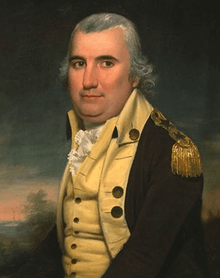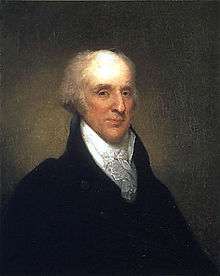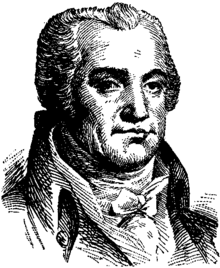United States Ambassador to France
| Ambassador of the United States to France Ambassadeur des États-Unis en France | |
|---|---|
|
Seal of the United States Department of State | |
| Residence | Hôtel de Pontalba |
| Nominator | The President of the United States |
| Inaugural holder |
Benjamin Franklin as Envoy |
| Formation | 1778 |
| Website | U.S. Embassy – Paris |
The United States Ambassador to France is the official representative of the President of the United States to the head of state of France. There has been a U.S. Ambassador to France since the American Revolution. The United States sent its first envoys to France in 1776, towards the end of the four-centuries-old Bourbon dynasty. The American diplomatic relationship with France has continued throughout that country's five republican regimes, two periods of French empire, the Bourbon Restoration, and its July Monarchy. After the Battle of France, the United States maintained diplomatic relations with Vichy France until France severed them on the date Operation Torch was launched in November 1942; the Embassy was reopened December 1944.[1]
List of United States Chiefs of Mission in Paris
Ministers to the Court of Versailles (1778–1792)
Relations between the United States and the French Court of Versailles were established in 1778 with the signing of the Treaty of Amity and Commerce (United States–France). As a republic, the United States maintained relations with France at the second-highest diplomatic rank of Minister. The position was formally known as the Minister Plenipotentiary from the United States of America at the Court of Versailles.
| Name | State | Appointment | Presentation | Termination | Notes | |
|---|---|---|---|---|---|---|
 |
Franklin, BenjaminBenjamin Franklin | Pennsylvania | September 14, 1778 | March 23, 1779 | May 17, 1785 | |
 |
Jefferson, ThomasThomas Jefferson | Virginia | March 10, 1785 | May 17, 1785 | September 26, 1789 | |
 |
Short, WilliamWilliam Short | Virginia | April 20, 1790 | June 14, 1790 | May 15, 1792 | |
 |
Morris, GouverneurGouverneur Morris | New York | January 12, 1792 | June 3, 1792 | April 9, 1794 | Remained as Minister after the First Republic was proclaimed. Mission terminated when the French government requested his recall. |
Ministers to the First Republic (1792–1804)
| Name | State | Appointment | Presentation | Termination | Notes | |
|---|---|---|---|---|---|---|
| |
Monroe, JamesJames Monroe | Virginia | May 28, 1794 | August 15, 1794 | December 9, 1796 | |
 |
Pinckney, Charles CotesworthCharles Cotesworth Pinckney | South Carolina | September 9, 1796 | Not presented | February 5, 1797 | |
Diplomatic relations were broken in 1796 due to French anger at U.S. neutrality in the War of the First Coalition. After the Directory refused to accept Charles Cotesworth Pinckney's credentials, a commission was appointed to negotiate with the French Republic. The members of the commission — Pinckney, John Marshall, and Elbridge Gerry — were all accredited with the rank of Envoy Extraordinary and Minister Plenipotentiary.[2] French officials demanded a bribe before they would commence negotiations, scuttling the mission in the XYZ Affair. Hostilities culminated in the outbreak of the Quasi-War between the U.S. and France. Diplomatic relations were restored with the Convention of 1800.
| Name | State | Appointment | Presentation | Termination | Notes | |
|---|---|---|---|---|---|---|
.jpg) |
Livingston, Robert R.Robert R. Livingston | New York | October 2, 1801 | December 6, 1801 | November 18, 1804 | Remained as Minister after Napoleon Bonaparte was proclaimed emperor. |
Ministers to the First Empire (1804–1815)
| Name | State | Appointment | Presentation | Termination | Notes | |
|---|---|---|---|---|---|---|
 |
Armstrong, JohnJohn Armstrong | New York | June 30, 1804 | November 18, 1804 | September 14, 1810 | |
| Russell, JonathanJonathan Russell | Massachusetts | September 14, 1810 (Became chargé d'affaires ad interim) |
Not credentialed | November 17, 1811 | Commissioned as chargé d'affaires en pied, but received no letter of credence. Although Russell remained a chargé d'affaires ad interim, the U.S. Department of State regards him as a Chief of Mission.[3] | |
 |
Barlow, JoelJoel Barlow | District of Columbia | February 27, 1811 | November 17, 1811 | December 26, 1812 | Died in Żarnowiec during the French retreat from Moscow. |
 |
Crawford, William H.William H. Crawford | Georgia | April 9, 1813 | December 14, 1813 | April 26, 1815 to April 30, 1815 | Reaccredited to the Court of Versailles. |
Ministers to France
- William H. Crawford was reaccredited to the Court of Versailles after the Restoration.
- Albert Gallatin July 16, 1816 – May 16, 1823
- James Brown: 1824–1829
- William C. Rives: 1829–1833
- Levett Harris: April 1833 – September 1833
- Edward Livingston: 1833–1836
- Lewis Cass: 1836–1842
- William Rufus King: 1844–1846
- Richard Rush: 1847–1848
- Richard Rush: 1848–1849
- William Cabell Rives: 1849–1853
- John Y. Mason: 1853–1859
- Charles J. Faulkner: 1860–1861
- William L. Dayton: 1861–1864
- John Bigelow: 1864–1866
- John Adams Dix: 1866–1869
- Elihu B. Washburne: 1869–1877
- Edward F. Noyes: 1877–1881
- Levi P. Morton: 1881–1885
- Robert Milligan McLane: 1885–1889
- Whitelaw Reid: 1889–1892
- T. Jefferson Coolidge: 1893–1893
Ambassadors to the Third Republic
- James Biddle Eustis: 1893–1897[4]
- Horace Porter: 1897–1905
- Robert Sanderson McCormick: 1905–1907
- Henry White: 1907–1909
- Robert Bacon: 1909–1912
- Myron T. Herrick: 1912–1914
- William Graves Sharp: 1914–1919
- Hugh Campbell Wallace: 1919–1921
- Myron T. Herrick: 1921–1929
- Walter E. Edge: 1929–1933
- Jesse Isidor Straus: 1933–1936
- William C. Bullitt: 1936–1940
- William D. Leahy: 1941–1942
- After Leahy left, S. Pinkney Tuck served as interim Chargé d'affaires until France severed diplomatic relations with the U.S. on November 8, 1942, the date of Operation Torch
Ambassadors to the Fourth Republic
- Jefferson Caffery: December 30, 1944 – 1949
- The Embassy in Paris had been opened to the public December 1, 1944, with Ambassador Caffery in charge pending presentation of his letter of credence.
- David K. E. Bruce: 1949–1952
- James C. Dunn: 1952–1953
- C. Douglas Dillon: 1953–1957
- Amory Houghton: 1957–1961
- James M. Gavin: 1961–1962
Ambassadors to the Fifth Republic
- Charles E. Bohlen: 1962–1968
- Robert Sargent Shriver, Jr.: 1968–1970
 R. Sargent Shriver
R. Sargent Shriver - Arthur K. Watson: 1970–1972
- John N. Irwin, II: 1973–1974
- Kenneth Rush: 1974–1977
- Arthur A. Hartman: 1977–1981
- Evan Griffith Galbraith: 1981–1985
- Joe M. Rodgers: 1985–1989
- Walter Curley: 1989–1993
- Pamela Harriman: 1993–1997
- Felix Rohatyn: 1997–2000
- Howard H. Leach: 2001–2005
- Craig Roberts Stapleton: 2005–2009
- Charles Rivkin: 2009–2013[5][6]
- Mark A. Taplin (ad interim): 2013–2014[7]
- Jane D. Hartley: October 31, 2014 – January 20, 2017
See also
- List of French ambassadors to the United States
- Embassy of the United States, Paris
- France – United States relations
- Foreign relations of France
- Ambassadors of the United States
References
- ↑ David McCullough, The Greater Journey: Americans in Paris, Simon & Schuster, 2011, ISBN 978-1-4165-7176-6
- ↑ Pinckney, Charles Cotesworth; Gerry, Elbridge; Marshall, John (1798). Authentic Copies of the Correspondence of Charles Cotesworth Pinckney, John Marshall, and Elbridge Gerry, Esqrs. Envoys Extraordinary and Ministers Plenipotentiary to the Republic of France: As Presented to Both Houses of Congress, April 3, 1798, by His Excellency John Adams. J. Derrett. p. 62.
The undersigned Envoys Extraordinary and Ministers Plenipotentiary of the United States of America to the French Republic, had the honour of announcing to you officially, on the 6th of October, their arrival at Paris, and of presenting to you on the 8th, a copy of their letters of credence.
- ↑ "Chiefs of Mission for France". Office of the Historian. U.S. Department of State.
- ↑ "Ambassadors and Chiefs of Mission – FAQs – About Us – Office of the Historian".
- ↑ Knowlton, Brian (August 16, 2009). "New U.S. Envoy Takes Up Post". The New York Times. Retrieved August 31, 2009.
- ↑ "Ambassador Charles Rivkin permanently departed post on Tuesday, November 19, 2013 following his nomination by President Obama to serve as Assistant Secretary of the State Department's Bureau of Economic and Business Affairs". Retrieved January 29, 2014.
- ↑ "Our Charge D'Affairs Ad Interim". US Embassy to France. Retrieved May 2, 2014.
![]() This article incorporates public domain material from the United States Department of State website http://www.state.gov/r/pa/ei/bgn/index.htm (Background Notes).
This article incorporates public domain material from the United States Department of State website http://www.state.gov/r/pa/ei/bgn/index.htm (Background Notes).
External links
- United States Embassy in Paris official site
- United States Department of State: France
- United States Department of State: Chiefs of Mission for France
- United States Department of State: Background notes on France
- Interview with 1984 U.S. Ambassador to France from the Dean Peter Krogh Foreign Affairs Digital Archives
